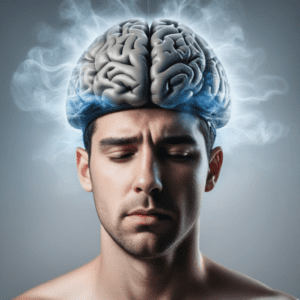Key Takeaways
- Identify what brain fog feels like: a sense of confusion, forgetfulness, and lack of focus and mental clarity.
- Address brain fog by optimizing your sleep, diet, hydration, and physical activity.
- Integrate brain-boosting foods like leafy greens and omega-3 rich fish into your diet, and avoid sugar and processed foods.
- Establish a consistent sleep routine to improve the quality of your rest.
- Stay hydrated and engage in regular physical exercise to enhance cognitive function.
What is Brain Fog and How Can You Clear It?
 Have you ever had a day where your thoughts seem to be moving through molasses? That’s brain fog for you. It’s that irritating feeling of being disconnected from your tasks, struggling to concentrate, and forgetting the little things. It’s like your brain is shrouded in a dense mist. But here’s the good news: you can cut through that fog with the right strategies.
Have you ever had a day where your thoughts seem to be moving through molasses? That’s brain fog for you. It’s that irritating feeling of being disconnected from your tasks, struggling to concentrate, and forgetting the little things. It’s like your brain is shrouded in a dense mist. But here’s the good news: you can cut through that fog with the right strategies.
Identifying Brain Fog
Recognizing brain fog is the first step to clarity. You might feel:
- Confused or disorganized
- Forgetful, like names and important dates just slip away
- Physically fatigued without a clear reason
- Mentally drained, even with simple tasks
When you spot these signs, it’s time to take action.
Common Causes of Mental Haze
Several factors can contribute to brain fog, including poor sleep, stress, diet, and lack of exercise. Sometimes, it’s a combination of these. The key is to identify what’s clouding your mental skies and tackle it head-on.
Fueling Brain Health: Diet Do’s and Don’ts
What you eat has a massive impact on your brain health. A diet rich in nutrients fuels your brain, while processed foods can drag it down. Let’s talk about what to eat and what to avoid.
Best Foods for Mental Clarity
Boost your brain by including these foods in your diet:
- Leafy greens like spinach and kale – they’re packed with brain-friendly vitamins.
- Oily fish such as salmon – hello, omega-3 fatty acids!
- Nuts and seeds – for a dose of antioxidants and healthy fats.
- Blueberries – these little berries are bursting with compounds that may delay brain aging.
- Whole grains – they release glucose slowly, providing you with a steady stream of energy.
These foods are not just good for your brain; they’re delicious and versatile too!
On the flip side, there are foods that can worsen brain fog. Sugary snacks and processed foods can lead to a quick energy spike followed by a crash, leaving you more foggy than before. Caffeine and alcohol can also impact your sleep and hydration levels, contributing to a murky mind. For more insights, consider learning about appetite suppressant foods that could help in managing your diet for better mental clarity.
Mastering Your Sleep: The Bedrock of Clarity
Sleep is when your brain detoxifies and recharges. If you’re not getting enough quality sleep, your brain can’t operate at its best. That’s why creating a sleep-inducing environment is crucial.
Creating a Sleep-Inducing Bedroom Environment
Your bedroom should be a sanctuary for sleep. Keep it cool, dark, and quiet. Consider using blackout curtains and earplugs if needed. And yes, this means no screens before bedtime. The blue light from your devices can mess with your sleep hormones.
Developing a Pre-Sleep Routine for Better Rest
A consistent pre-sleep routine signals to your brain that it’s time to wind down. This could include:
- Reading a book
- Doing some light stretching or yoga
- Writing in a journal
Stick to this routine and watch your sleep improve.
Movement and Mindfulness: Exercise Your Way to Clear Thoughts
Physical exercise isn’t just for your body; it’s a workout for your brain too. Engaging in regular physical activity increases blood flow to the brain, which can help clear the fog. For those experiencing discomfort that may limit physical activity, exploring supplements for joint pain may be beneficial in supporting a more active lifestyle.
The Role of Physical Exercise in Combating Brain Fog
Exercise releases endorphins, which have mood-boosting effects. It also helps to manage stress, a common culprit behind brain fog. Aim for at least 30 minutes of moderate exercise most days of the week. This could be a brisk walk, a bike ride, or a dance class – whatever gets you moving!
Remember, the journey to mental clarity isn’t a sprint; it’s a marathon. And you’ve just taken the first few steps. In the next part, we’ll dive deeper into supplements, hydration, and mind training techniques to keep the momentum going.
Mindfulness is more than a buzzword; it’s a tool for mental maintenance. When you’re mindful, you’re fully present in the moment, which can be incredibly helpful for clearing brain fog. By focusing on the here and now, you can sweep away the cobwebs of distraction.
Mindfulness Practices for Mental Sharpness
Start with deep breathing exercises; they can help reduce stress, which is often a fog-inducer. Try meditating for a few minutes each day, focusing on your breath or a mantra. If sitting still isn’t your thing, consider walking meditation—simply walk slowly and concentrate on the sensation of your feet touching the ground. These practices can center your thoughts and bring you back into sharp focus.
Brain-Boosting Supplements: Navigating Natural Remedies
When it comes to supplements, it’s essential to choose wisely. Many claim to clear brain fog, but not all are backed by science. Let’s explore the ones that have earned their reputation.
The Power of Omega-3 Fatty Acids and Antioxidants
Omega-3 fatty acids, found in fish oil supplements, are known for their brain health benefits. They can improve cognitive function and protect against age-related mental decline. Antioxidants, like vitamins C and E, fight off free radicals that can damage brain cells. Including these in your diet or taking them as supplements can help keep your mind clear.
Herbs and Vitamins That Support Cognitive Function
- Ginkgo Biloba: This herb is said to improve blood flow to the brain and act as an antioxidant.
- Vitamin B12: A deficiency in B12 can lead to brain fog, so supplementation may be beneficial for some.
- Lion’s Mane Mushroom: Some studies suggest this fungus supports brain health and cognitive function.
Before starting any supplement, it’s crucial to talk to a healthcare provider, especially if you have underlying health conditions or are taking other medications.
Hydrate to Concentrate: The Importance of Water Intake
Dehydration is a sneaky saboteur of mental clarity. Even mild dehydration can affect your concentration and memory. The fix is simple: drink water throughout the day. Aim for at least 8 glasses, and if you’re active or it’s hot, you might need more. Water helps your brain’s electrical energy for all its functions, including thought and memory processes, so keep that water bottle handy.
Banishing Brain Fog with Mind Training Techniques
Just as you would train your muscles at the gym, you can train your brain to be more focused and clear. Cognitive exercises, like puzzles and brain games, can strengthen your mental faculties. They’re not just for fun—they’re fitness for your brain.
Cognitive Exercises for Enhancing Focus
Try crosswords, Sudoku, or chess. These games require concentration and problem-solving, which can help clear the fog. There are also apps designed specifically for brain training, so you can practice on the go.
Option A.
Seeking Professional Help: When to Consult a Doctor
- If you’ve tried these strategies and your brain fog persists, it may be time to see a doctor.
- Brain fog can sometimes be a symptom of underlying health issues, like thyroid problems, anemia, or depression.
- Consistent memory problems or confusion warrant a professional evaluation.
Don’t hesitate to seek help if you’re concerned. A healthcare provider can offer personalized advice and treatment options.
Recognizing Persistent Symptoms of Brain Fog
If you find that your brain fog is not lifting despite your best efforts, pay attention to the persistence of symptoms. Are you experiencing this fog daily? Does it interfere with your work or personal life? These are signs that you might need a more targeted approach.
Understanding Professional Brain Fog Interventions
Healthcare professionals may suggest cognitive therapy, medication, or lifestyle changes. They can also test for deficiencies or hormonal imbalances that could be contributing to your brain fog.
Empower Your Brain: Practical Actions You Can Take Today
You have the power to clear the fog and sharpen your mental clarity. Start by tweaking your diet, sleep, and exercise habits. Incorporate mindfulness and brain exercises into your routine. Stay hydrated and consider supplements. And if needed, reach out for professional help.
Putting Tips Into Practice: A Step-by-Step Guide
Here’s how to get started:
- Examine your current habits and identify areas for improvement.
- Make one change at a time to avoid becoming overwhelmed.
- Track your progress and celebrate small victories.
Remember, the path to mental clarity is a personal journey. What works for one person may not work for another. Find what works for you, stick with it, and watch the fog lift.
Personal success stories can be incredibly motivating. Take Sarah, for example, who struggled with brain fog after having her second child. She felt perpetually out of sorts, forgetting appointments and struggling to focus at work. By prioritizing her sleep, tweaking her diet to include more brain-healthy foods, and incorporating short meditation sessions into her daily routine, she saw a significant improvement in her mental clarity within a few weeks. Stories like Sarah’s show that with the right approach, overcoming brain fog is entirely possible.
Where Science Meets Clarity: Innovative Research and Outlook
Exciting research is continuously unveiling new ways to combat brain fog. One of the most promising discoveries is the so-called “King of the Jungle” nutrient, which has shown potential in sharpening focus, improving memory, and eliminating brain fog. This nutrient, found in a particular type of mushroom known as Lion’s Mane, is gaining attention for its cognitive-enhancing properties. To learn more about how this nutrient could benefit you, explore the best supplements for cognitive enhancement.
Frequently Asked Questions (FAQ)
What is the best way to start improving mental clarity?
The best way to start is by assessing your lifestyle. Look at your sleep patterns, diet, hydration levels, and physical activity. Making small, incremental changes in these areas can lead to significant improvements in mental clarity.
Are there any quick-fix solutions for brain fog?
While there are no instant solutions, certain actions like staying hydrated, taking short walks, or practicing deep breathing can provide quick relief from mild brain fog. For more comprehensive strategies, consider exploring gut health supplements that support overall cognitive function.
How long does it typically take to see improvements in brain fog?
Improvements can be seen in as little as a few days when you make positive lifestyle changes, but it may take longer for more persistent cases. Consistency is key. For those looking for additional strategies, exploring effective blood sugar management strategies can also be beneficial as blood sugar fluctuations can impact cognitive function.
Can brain fog be a symptom of more serious health issues?
Yes, brain fog can sometimes be a symptom of underlying conditions such as thyroid disease, vitamin deficiencies, or sleep disorders. If brain fog persists, it’s important to consult with a healthcare professional.
What daily habits contribute the most to reducing brain fog?
Daily habits that can make a significant difference include:
- Getting 7-9 hours of quality sleep each night
- Eating a balanced diet rich in antioxidants and omega-3s
- Drinking enough water to stay properly hydrated
- Engaging in regular physical and mental exercise
- Practicing stress-reduction techniques like mindfulness or meditation
Brain fog doesn’t have to be a permanent fixture in your life. With the right approach, you can clear the haze and enjoy the view with a sharp, focused mind. Start by implementing the tips discussed in this article, and remember, if you’re looking for a potential breakthrough in brain health, don’t forget to Learn More about the “King of the Jungle” nutrient and how it could help you on your journey to mental clarity.





